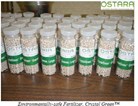SFPUC And Ostara Demonstrate Innovative Technology That Recycles Harmful Sewage Byproduct To Environmentally-Safe Fertilizer

A pilot project at The San Francisco Public Utilities Commission's (SFPUC) Southeast Wastewater Treatment Plant is the first plant in California to demonstrate a new technology that removes phosphorus and other nutrients from wastewater and recycles them into environmentally-safe commercial fertilizer.
The technology was developed by Ostara Nutrient Recovery Technologies Inc. of Vancouver, Canada to help wastewater treatment plants solve environmental problems, increase plant capacity and reduce maintenance costs, while also creating a revenue-producing byproduct named Crystal Green™ .
The Ostara pilot facility began operating in Nov 2008 at the Southeast Wastewater Treatment Plant in San Francisco. "The SFPUC is excited to be the first agency in California piloting this new innovative technology, said Tommy T. Moala, Assistant General Manager for the SFPUC Wastewater Enterprise. "We want to lead by example on how wastewater utilities can be sustainable by transforming a waste into something beneficial for all. Another example of where we are doing that is SFGreasecycle, the City's grease-to-biofuel recycling program." Phillip Abrary, President and CEO of Ostara, said many wastewater treatment plants are effective at removing phosphorus and other pollutants and diverting them into a sludge stream of liquids and solids — but are left with the problem of disposing of these nutrients as well as operational challenges created because these nutrients can form a concrete-like scale, called "struvite", in pipes and equipment at the treatment plant. This in turn results in costly maintenance procedures required to remove or prevent the scale from forming.
"In the case of SFPUC's Southeast Wastewater Treatment Plant, our reactor integrates into the wastewater treatment system, processes the sewage sludge liquids, which would otherwise clog up pipes, to recover and decrease the phosphorus levels on average by 85 per cent – and then converts them into a high-quality environmentally-friendly commercial fertilizer that can generate revenue for the municipality," said Abrary.
The pilot project will last about 6 weeks until mid-December. Its objective is to demonstrate the technology, gain technical and performance data and perform economic evaluation of the process, with the results specific to the Southeast Treatment Plant.
A demonstration of the process and successful results of the pilot were shared with invited water/ wastewater utilities and members of the media from the western U.S. region at the SFPUC Southeast Wastewater Treatment plant this morning. The demonstration was followed by a guided tour of the pilot project site at the plant. All guests received samples of the fertilizer, Crystal Green™ , produced at the plant during the pilot period.
About the SFPUC
The San Francisco Public Utilities Commission (SFPUC) is a department within the City and
County of San Francisco that provides drinking water and wastewater services to San
Francisco, wholesale water to three other Bay Area counties, and hydroelectric power to
many of San Francisco's municipal services. The SFPUC has close to 2,000 employees with
a combined annual operating budget of approximately $400M.
About Ostara
Ostara Nutrient Recovery Technologies Inc., founded in 2005, is a Vancouver-based
company commercializing proprietary technologies that recover resources from wastewater
and recycle them into valuable products. Ostara's struvite recovery process, developed at the
University of British Columbia (UBC), recovers pollutants that would otherwise be released
into the environment, helps wastewater treatment plants reduce operating costs and meet
environmental regulations, and provides municipalities and utilities with revenue from the
sale of the recovered pollutants that are recycled into environmentally safe slow-release
fertilizer, Crystal Green™ .
SOURCE: San Francisco Public Utilities Commission and Ostara
